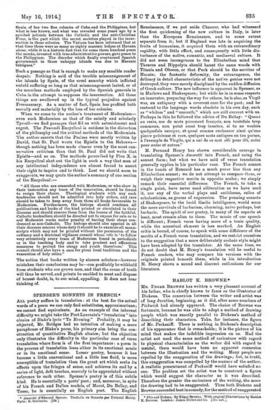SPENSER'S SONNETS IN FRENCH.*
ALL poetry suffers in translation: at the best for the actual words of a poem we can only find substitutes, approximations; we cannot find equivalents. As tin example of the inherent difficulty we might take the Poet Laureate's " translation" into alcaics of Blake's lyric "To Evening." Probably, it may be objected, Mr. Bridges had no intention of making a mere paraphrase of Blake's poem, his primary aim being the con- struction of quantitative English alestica; but the objection only illustrates the difficulty in the particular case of verse translation where form is of the first importance: a poem in the process of translation loses either in its emotional music or in its emotional sense. Lesser poetry, because it has become a little conventional and a little leas fluid, is more susceptible of translation than the great art which seeks its effects upon the fringes of sense, and achieves its end by a series of light, deft touches, scarcely to be appreciated without reference to each 'other. Spenser's poetry is of this subtle kind. He is essentially a poets' poet; and, moreover, in spite of his French and Italian models, of Marot, Du Beihry, and Tags°, he is essentially an English poet. The English 4 1hrtoralti Samna Spernscr. Trsdnits en Peewits par Fernand Henry, Paris : E. Guilmoto. Renaissance, if we put aside Chaucer, who had witnessed the first quickening of the new culture in Italy, is later than the European Renaissance, and to some extent separate from it; but if England was late in acquiring the fruits of humanism, it acquired them with an extraordinary rapidity, with little effort, and consequently with little dis- turbance of the native, romantic, and mediaeval culture. It did not seem incongruous to the Elizabethan mind that Theseus and Hippolyta should haunt the same woods with Titania and Oberon, or that Puck should be the servitor of Hecate; the fantastic deformity, the extravagance, the delicacy in detail characteristic of the native genius were not destroyed, they were merely disciplined by the sadden diffusion of Greek culture. The new influence is apparent in Spenser, as in Marlowe and Shakespeare; but while he is in some respects an innovator, preparing the way for others, he is also, as Virgil was, an antiquary with a reverent care for the past; and he restored to the language words obsolete in his own day, such as " whilom" and " uncouth," which are still current with us. Perhaps in this he followed the advice of Dn Belay: " Quaut an reste, use de mots pavement Francois, non toutefois trop commons, non point aussi trop inusitez, si to ne voulois quelquefois usurper, et quasi comma enchasser ainsi qu'une pierre preciense et raps, quelques mote antiques en ton poems, rexemple de Virgile, qui a use de ce mot o/// pour Ulf, ardai pour atlas et entree."
M. Fernand Henry has shown considerable courage in translating Spenser's Amoretti into French, and using the sonnet form; but what we have said of verse translation generally applies in his 'particular ease. The French sonnet in the hands of Ronsard has a much purer line than any Elizabethan sonnet; we do not attempt to compare them, or weigh their respective merits in opposite scales ; we simply remark their essential difference. The French, to take a single point, have never used alliteration as we have used it, nor any of the verbal plays and antitheses, relics of scholasticism, as graces of expression. The punning sonnets of Shakespeare, to the lucid Gaelic intelligence, would seem the mere survivals of barbarism, charming, naive perhaps, but barbaric. The spirit of our poetry, in many of its aspects at least, must remain alien to them. The music of our speech is different ; French verse having more of a tonic quality, while the accentual element is less marked. An English critic is bound, of course, to speak with some diffidence of the merits of a French verse translation, and we restrict ourselves to the suggestion that a more deliberately archaic style might have been adopted by the translator. At the same time, we do not doubt that M. Henry's translation will be useful to French readers, who may compare Lis versions with the originals printed beneath them, while in his introduction M. Henry shows a sound and discreet enthusiasm for our literature.










































 Previous page
Previous page